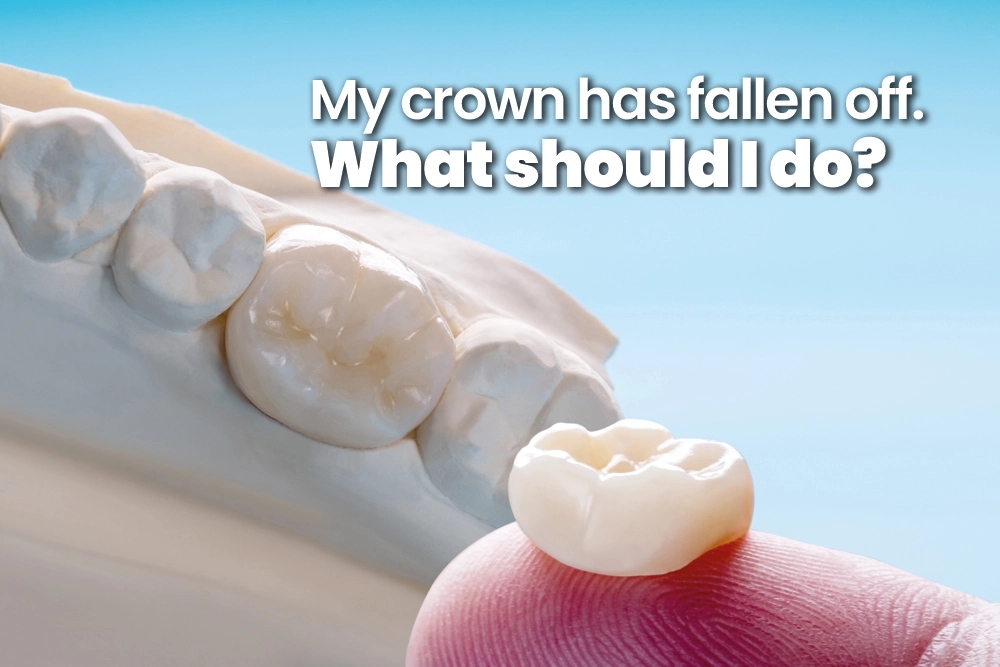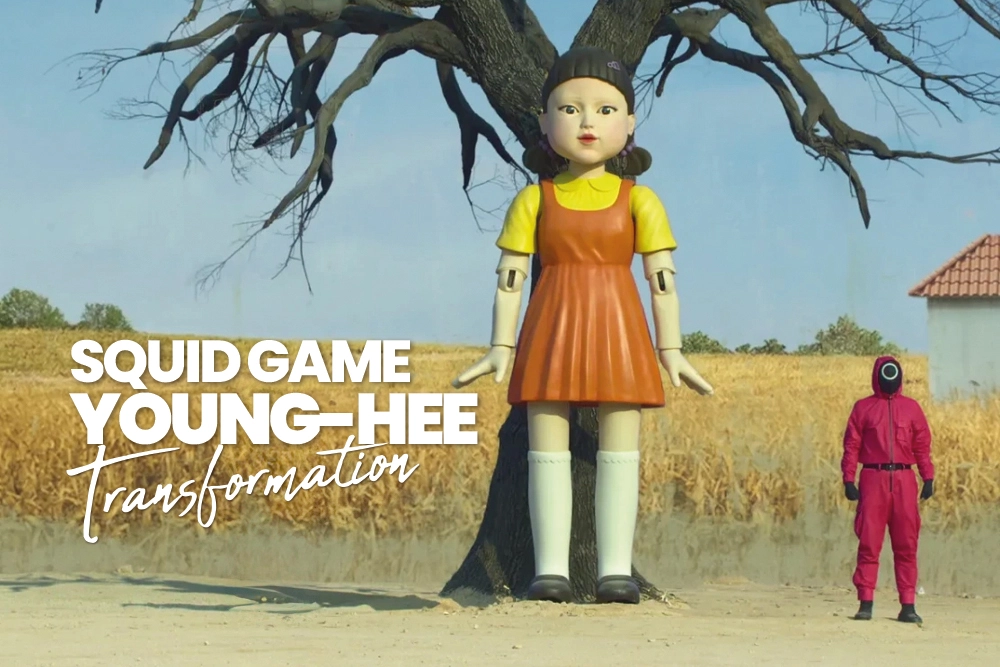My Crown Has Fallen Off. What Should I Do? Losing a dental crown can be alarming because it leaves the underlying tooth vulnerable to damage or infection. A dental crown is a cap placed over a tooth to restore its shape, strength or appearance, and when it falls off, immediate action is needed to protect your tooth. Contact your dentist as soon as possible to schedule an appointment and address the issue.
In the meantime, keep the dental crown in a secure place and avoid chewing on the affected area. This article provides guidance on what to do when a dental crown becomes dislodged, how to care for the tooth and steps to prevent future issues with dental crowns.
What Is A Crown?
What Is A Crown? A dental crown is a custom made restoration that covers a damaged or weakened tooth to restore its function and appearance. The crown is made to fit the tooth structure precisely, often used after procedures like a root canal or to protect a tooth from further tooth decay. Dental crowns can also enhance the aesthetics of a tooth, especially when placed on the front of a tooth.
Crowns are typically made from materials like porcelain, ceramic or metal, designed to blend with your natural teeth. The crown may become loose or fall off due to wear, decay or improper fit. If a crown has fallen off, contact a dentist immediately to inspect the crown and tooth underneath to determine the next steps.
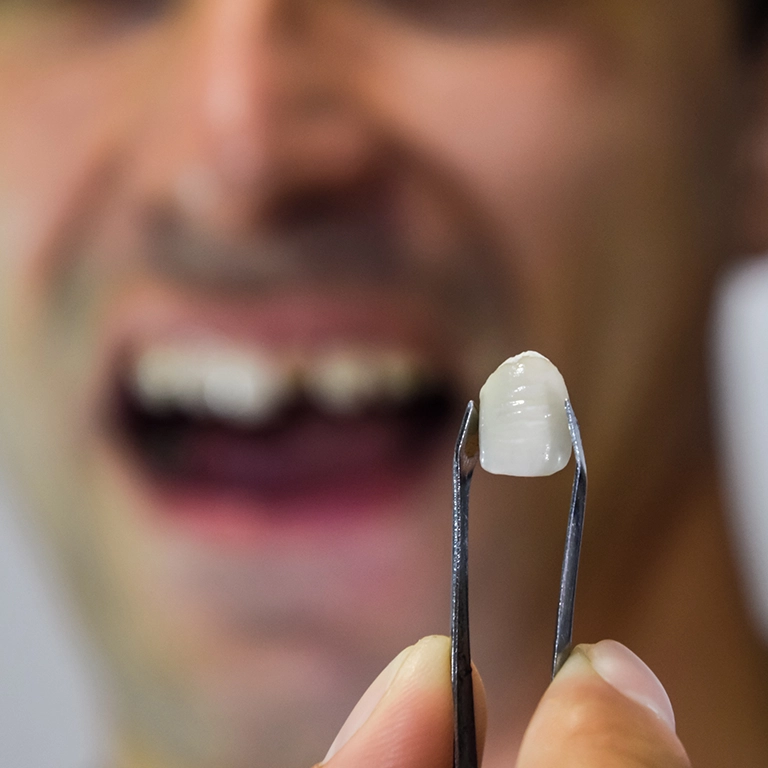
After Your Crown Falls Off
After Your Crown Falls Off When a dental crown has fallen off, the tooth beneath is exposed, increasing the risk of damage to your tooth or infection. Inspect the crown carefully to check for cracks or damage and bring the crown to your dental appointment. Avoid using the side of your mouth with the exposed tooth to prevent tooth decay or further harm.
Rinse your mouth with warm water to keep the area clean and consider using over the counter dental cement to temporarily reattach the crown if advised by your dentist. The dentist will examine your mouth to assess the state of the crown and determine whether it can be reattached or if a new crown is needed.
Do I Need Urgent Dental Care?
Do I Need Urgent Dental Care? A lost dental crown may indicate a dental emergency, especially if the tooth is damaged or painful. If the crown falling is accompanied by pain, swelling or bleeding, make an emergency dental appointment immediately. The dentist may need to address underlying issues like tooth decay or a damaged tooth structure.
Even without pain, it’s important to contact a dentist as soon as possible to prevent complications. A temporary dental crown or dental adhesive can protect the tooth temporarily, but only a dentist can properly reattach or replace the crown. Delaying care can worsen dental problems so schedule an appointment promptly.
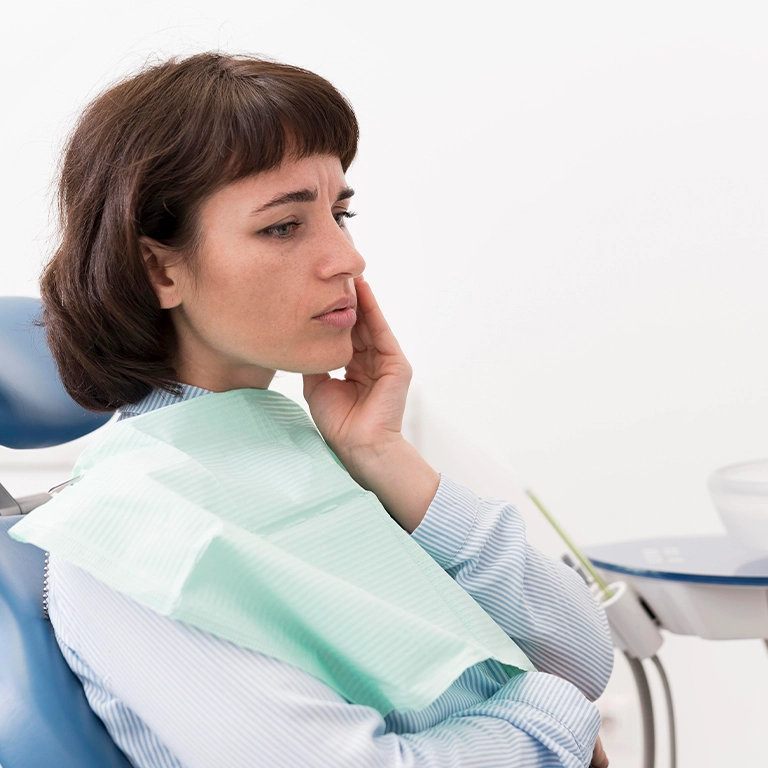
What to Do When a Dental Crown Becomes Dislodged
What to Do When a Dental Crown Becomes Dislodged When a dental crown becomes loose or falls off, take immediate steps to protect the tooth and crown. First, retrieve the crown and store it in a clean, secure place such as a small container or plastic bag. Avoid chewing on the side of your mouth where the crown has become loose to prevent further damage.
Gently clean the inside of the crown and the tooth underneath with warm water to remove debris. If the dentist advises, you may be able to temporarily reattach the crown using over the counter dental cement. However, this is a temporary solution, so contact your dentist immediately to schedule a dental appointment for proper care.
What to Do If Your Dental Crown Falls Off
What to Do If Your Dental Crown Falls Off If your dental crown falls off, stay calm and follow these steps to manage the situation. Carefully remove the crown from your mouth and inspect it for damage. Keep the dental crown in a secure place to avoid losing it and rinse your mouth to keep the tooth beneath clean and free of food particles.
Avoid eating hard or sticky foods and do not attempt to chew with the affected tooth. If the crown and your tooth are intact, the dentist may reattach the crown with dental cement. Otherwise, you may need a new crown made. Contact your dentist as soon as possible to get your crown properly assessed and fitted.
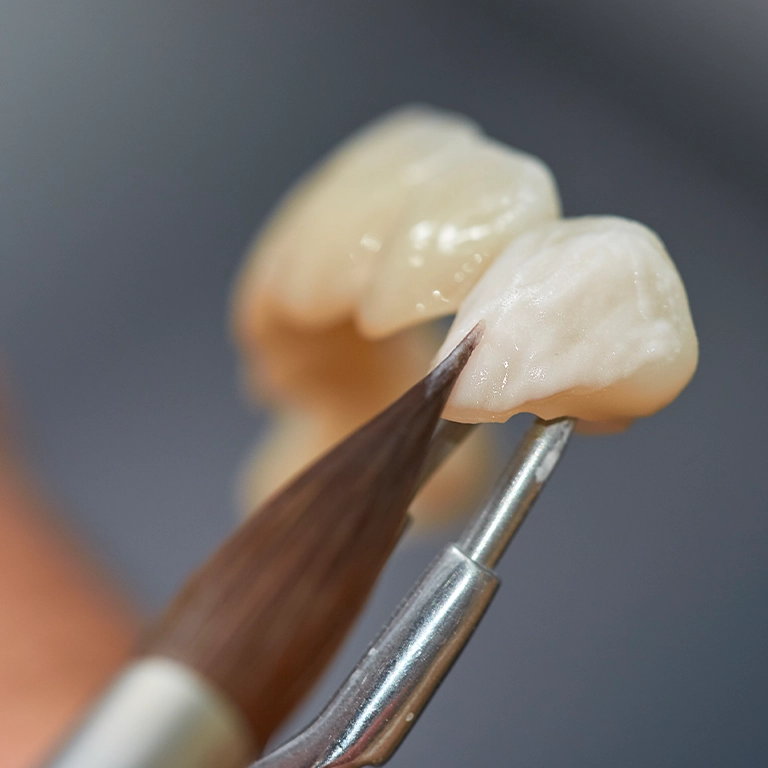
How Long Can You Go Without a Crown?
How Long Can You Go Without a Crown? Going without a dental crown for an extended period can lead to serious dental problems, such as tooth decay or damage to the tooth under the crown. The exposed tooth is vulnerable to bacteria, sensitivity or fracture, especially if it has undergone a root canal or has significant tooth structure loss.
Ideally, you should see your dentist within a few days to reattach or replace the crown. If you must wait to see the dentist, use temporary dental cement to protect the tooth but avoid delaying the appointment. A dentist will determine whether the existing crown can be reattached or if a permanent crown is needed.
How to Prevent a Dental Crown From Falling Off
How to Prevent a Dental Crown From Falling Off Preventing a dental crown from falling off requires diligent dental hygiene and care. Brush your teeth twice daily and floss regularly to prevent tooth decay under the crown, which can cause the crown to become loose. Avoid chewing hard foods, like ice or nuts, because they can dislodge the crown.
Regular dental checkups allow the dentist to monitor the crown and your tooth for signs of wear or decay. If you grind your teeth, talk to your dentist about a nightguard to protect the crown. Maintaining good dental health reduces the risk of the dental crown falling and ensures its longevity.
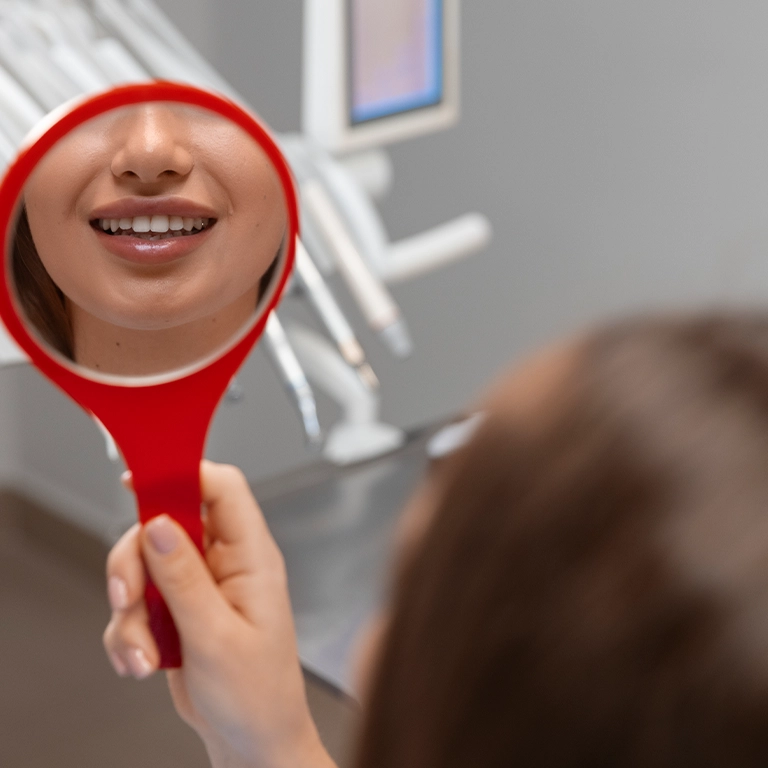
How to Take Care of Dental Crowns
How to Take Care of Dental Crowns Proper care of dental crowns is essential to keep them secure and functional. Practice good dental hygiene by brushing twice daily with a soft toothbrush and flossing to remove plaque around the crown and your tooth. This helps prevent tooth decay that could weaken the crown’s foundation.
Avoid sticky or hard foods that might loosen the crown and visit your dentist regularly for cleanings and inspections. The dentist may check the crown’s fit and the tooth underneath to ensure no underlying issues exist. With proper care, a dental crown can last many years, supporting your dental health.
Keep the Dental Crown in a Secure Place
Keep the Dental Crown in a Secure Place When a crown has fallen, keeping the dental crown in a secure place is critical to avoid losing or damaging it. Place the crown in a small, clean container, like a plastic bag or a box with a lid, to protect it until your dental appointment. Avoid wrapping it in tissue because it could be mistaken for trash.
Inspect the crown to determine if it’s intact because a damaged crown may need to be replaced. Bring the crown to your dentist, who will evaluate whether it can be reattached or if a new crown is necessary. Storing it safely ensures the dentist can assess the crown and your tooth effectively.
Additional Tips for Managing a Lost Dental Crown
Additional Tips for Managing a Lost Dental Crown Beyond immediate steps, additional precautions can help manage a lost dental crown. Avoid hot or cold foods because the tooth beneath may be sensitive without the crown’s protection. If you experience pain, take over the counter pain medication, like ibuprofen, to reduce discomfort but consult your dentist before prolonged use.
Do not attempt to permanently reattach the crown with household glues because they can damage the crown or tooth. If the crown and the crown’s fit seem intact, the dentist may use dental cement to reattach it. Always make an emergency appointment with your dentist to ensure proper treatment and avoid complications like an emergency dental issue.
Why Dental Crowns Fall Off and How to Address It
Why Dental Crowns Fall Off and How to Address It A dental crown may fall off due to several reasons, such as tooth decay weakening the tooth structure, an improper initial fit or wear of the dental adhesive over time. Chewing sticky or hard foods can also cause the crown to become loose. The dentist will examine the crown and the tooth to identify the underlying issue.
If the crown is intact, the dentist may reattach it with dental cement. If the tooth is damaged or the crown is broken, a new crown may be required. Addressing the cause of the crown falling, such as improving dental hygiene or adjusting your diet, can prevent future issues and protect your dental health.
The Role of Regular Dental Checkups
The Role of Regular Dental Checkups Regular dental checkups are crucial for maintaining the longevity of your dental crown and overall dental health. During these visits, the dentist will inspect the crown to ensure it remains secure and check for signs of decay or damage to the tooth underneath. Early detection of issues can prevent the crown from falling off.
Schedule an appointment every six months or as recommended by your dentist to keep your crown in good condition. Regular dental care also helps address minor issues before they become emergencies, reducing the risk of losing a dental crown and ensuring the crown will eventually serve its purpose for years.
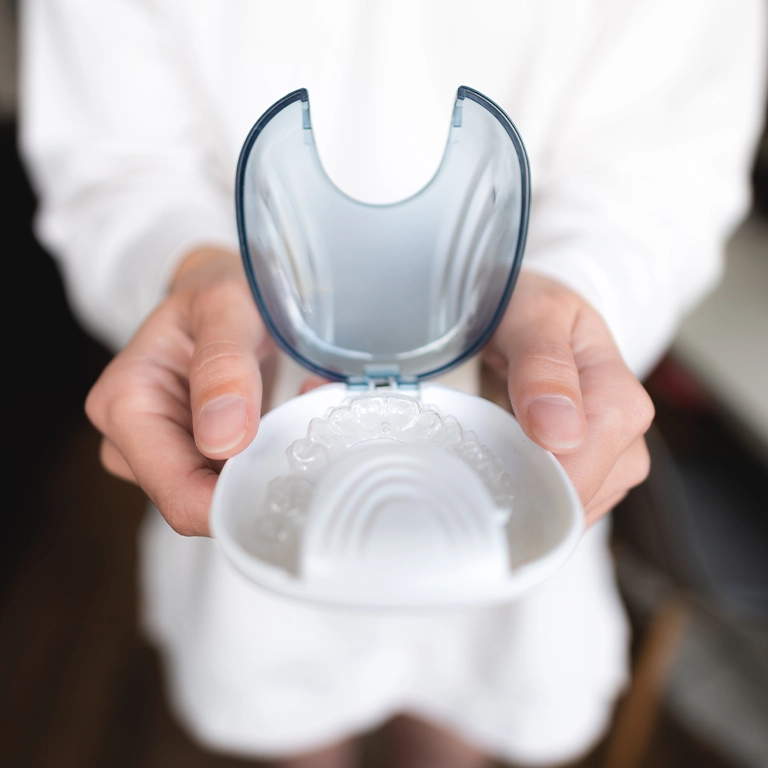
Understanding the Costs and Replacement Process
Understanding the Costs and Replacement Process If a dental crown has fallen and cannot be reattached, you may need a new crown made. The cost of a new crown varies depending on the material and complexity but regular dental care can help avoid unexpected expenses. The dentist will examine the tooth under the crown to assess whether additional treatments, like a root canal, are needed before fitting a new crown.
The replacement process involves taking impressions of your teeth to create a custom fitted crown. Temporary dental crowns may be used while the permanent crown is made. Contact your dentist to schedule an appointment and discuss options to ensure the new crown is properly fitted to your tooth.
Long Term Care for Dental Crowns
Long Term Care for Dental Crowns Long term care for dental crowns involves consistent oral hygiene and lifestyle adjustments. Avoid habits like nail biting or chewing on pens because they can weaken the crown’s bond. Using a fluoride toothpaste strengthens the tooth beneath the crown, reducing the risk of decay.
If you participate in sports, consider a mouthguard to protect your tooth and crown from trauma. The dentist may recommend specific products or techniques to maintain the crown’s integrity. By prioritizing dental care, you can prevent the dental crown from falling and maintain a healthy smile.
When to Seek Emergency Dental Care
When to Seek Emergency Dental Care Certain situations involving a lost dental crown require immediate attention. If the crown falling is accompanied by severe pain, swelling or signs of infection, make an emergency appointment with your dentist. These symptoms may indicate a dental emergency, such as an abscess or significant damage to your tooth.
Even if the crown has become loose without pain, it’s important to contact a dentist as soon as possible to avoid complications. The dentist will examine your mouth to determine whether the crown can be reattached or if a new crown is needed. Acting quickly helps protect the tooth and prevents further dental problems.
Frequently Asked Questions
How Long Can You Go When Your Crown Falls Off?
How Long Can You Go When Your Crown Falls Off? You should not go more than a few days without a dental crown because the exposed tooth is at risk of decay or damage. Contact your dentist immediately to schedule an appointment and use temporary dental cement if advised to protect the tooth until the crown can be reattached or replaced.
Can I Put My Crown Back in Myself?
Can I Put My Crown Back in Myself? You may be able to temporarily reattach the crown using over the counter dental cement if the crown and tooth are undamaged. However, this is not a permanent solution, so contact a dentist as soon as possible to properly reattach or replace the crown.
Is a Fallen Crown an Emergency?
Is a Fallen Crown an Emergency? A fallen crown can be a dental emergency if accompanied by pain, swelling or damage to the tooth underneath. Make an emergency dental appointment if symptoms are severe or see your dentist promptly to prevent complications like tooth decay or infection.
What to Do If a Crown Has Fallen Out?
What to Do If a Crown Has Fallen Out? If a crown has fallen out, keep the dental crown in a secure place, rinse your mouth with warm water and avoid chewing on the affected tooth. Contact your dentist immediately to schedule an appointment to reattach or replace the crown and protect your tooth.
Follow us on Social Media
internationalplusofficial
internationalplus
internationalplusdental
This content is written, reviewed, and approved by the International Plus Medical Review Board to ensure clinical accuracy and adherence to strict editorial standards. All medical information is regularly monitored, audited and updated in light of the latest scientific advancements.
However the information provided here is for general informational purposes only and cannot be used for self diagnosis or making individual health interpretations. Results of medical treatments depend on individual anatomy and the unique healing process of each patient. This information should not replace a personal consultation with a qualified healthcare professional. To understand the best options for your specific needs and to receive a personalized treatment plan, we invite you to book a free consultation with the expert medical team at International Plus.
International Plus was established from scratch in 2014 with the sole purpose of providing a world class center for plastic and cosmetic surgery by SAMİLSAN SAĞLIK HİZMETLERİ TURİZM DANIŞMANLIK TİCARET LİMİTED ŞİRKETİ International Plus has developed a worldwide reputation for its unique treatments and techniques. With over 10 years of experience, our talented medical experts are among the best in their respective fields. You are our priority. We are convinced that good communication between you and your surgeon is essential when planning your treatments. We offer realistic advice and the most suitable treatments for you.

